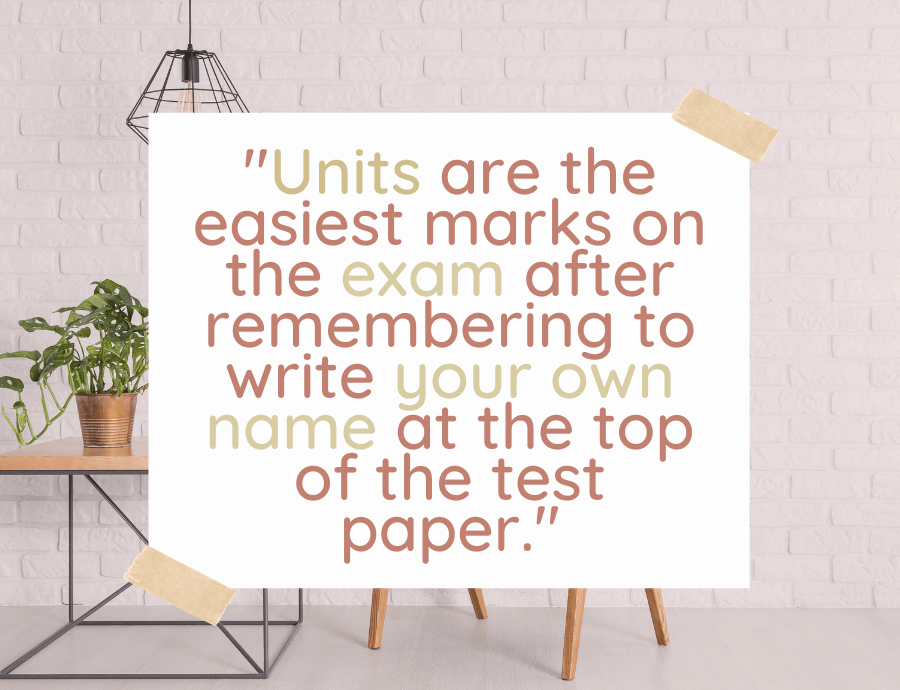In science and engineering exams the units are always easiest part of the answer. They’re also the easiest marks to lose! Every year countless students throw away free marks by forgetting to add those little letters after long answers. And we mean literally countless, because without units your numbers literally can’t be counted as anything.
How much could you lose for missing one unit? NASA once lost an entire interplanetary mission, 125 million dollars, and countless person-hours of interplanetary engineering and science. The Mars Climate Orbiter became the Mars Atmospheric Firework because one team used pounds, another used Newtons, and neither labelled or checked their units.
Obviously you won’t lose quite as much, maybe just a mark or two, but that kind of disaster is why some courses are so strict about marks for units. Some specifically include trick questions and extra tests for these units: switching between metric and imperial units in different questions, giving you masses and distances in grams and centimetres instead of kilograms and meters, or even changing volume calculations to cc’s instead of cubic meters.
Luckily the conversion math is simple, because units have to obey the same math as all the numbers. The trick is remembering that you have to do it at all. Your first step when preparing for the exam should be studying past exams and any example problems your professor gave during the year. Do they often include unit shenanigans? Is there any kind of conversion they like to challenge you with? If so make sure you ALWAYS check your units in the question, and again ALWAYS check units in your answers.
ALWAYS means ALWAYS, and that includes when you’re practicing! If you “save time” by skipping these steps while you’re studying you’re making it much more likely that you’ll miss these tricks when they come up in the exam. You should always practice the way you’re going to actually do the problem on the day. That’s what practice is for! Skipping steps to cover more calculations means you’re specifically practicing to do the question wrong. And when you’re stressed in the exam hall it’s much more likely you’ll fall back into old habits instead of remembering all the extra things you thought you’d do when it counts.
Units are the easiest marks on the exam after remembering to write your own name at the top of the test paper. And you should be just as familiar with them. Because in scientific calculations the correct units are the difference between discovering a whole new world and a total disaster.
The wrong units once cost $125 million.
How much could you lose for missing one unit? NASA once lost an entire interplanetary mission, 125 million dollars, and countless person-hours of interplanetary engineering and science. The Mars Climate Orbiter became the Mars Atmospheric Firework because one team used pounds, another used Newtons, and neither labelled or checked their units.
Obviously you won’t lose quite as much, maybe just a mark or two, but that kind of disaster is why some courses are so strict about marks for units. Some specifically include trick questions and extra tests for these units: switching between metric and imperial units in different questions, giving you masses and distances in grams and centimetres instead of kilograms and meters, or even changing volume calculations to cc’s instead of cubic meters.
Luckily the conversion math is simple, because units have to obey the same math as all the numbers. The trick is remembering that you have to do it at all. Your first step when preparing for the exam should be studying past exams and any example problems your professor gave during the year. Do they often include unit shenanigans? Is there any kind of conversion they like to challenge you with? If so make sure you ALWAYS check your units in the question, and again ALWAYS check units in your answers.
ALWAYS means ALWAYS, and that includes when you’re practicing! If you “save time” by skipping these steps while you’re studying you’re making it much more likely that you’ll miss these tricks when they come up in the exam. You should always practice the way you’re going to actually do the problem on the day. That’s what practice is for! Skipping steps to cover more calculations means you’re specifically practicing to do the question wrong. And when you’re stressed in the exam hall it’s much more likely you’ll fall back into old habits instead of remembering all the extra things you thought you’d do when it counts.
Units are the easiest marks on the exam after remembering to write your own name at the top of the test paper. And you should be just as familiar with them. Because in scientific calculations the correct units are the difference between discovering a whole new world and a total disaster.








